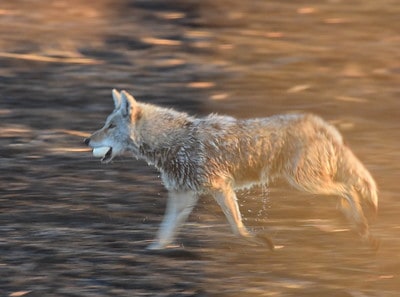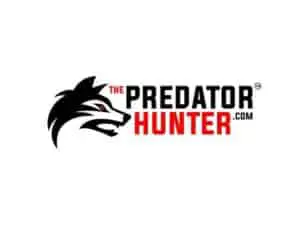The rules for hunting coyotes in South Carolina are a predator hunter’s dream. Take a minute to read through them here; then check for updates before you make your first stand.

In South Carolina, a hunting license is required to hunt coyotes. There is no closed season or bag limits on private property. Night hunting is permitted on registered properties, or with a depredation permit. Baiting and electronic callers are permitted.
Purchase a South Carolina hunting license here.
Check out all of the South Carolina hunting seasons.
Related: Learn the rules for hunting fox in South Carolina.
Related: Learn the rules for hunting bobcats in South Carolina.
Hunting coyotes in South Carolina at night.
Night hunting does require the registration of the property being hunted. Please be sure to carefully review the law mentioned below.
Private Property Night Hunting Notice and Registration for Hunting Feral Hogs, Coyotes, or Armadillos at Night.
Feral hogs, coyotes, and armadillos may be hunted at night on registered properties on which a person has a lawful right to hunt. Feral hogs, coyotes, or armadillos may not be hunted at night on any unregistered property, except with a DNR-issued depredation permit. A hunting license is required of any hunters 16 years or older.
- On registered properties, feral hogs, coyotes, or armadillos may be hunted at night with artificial lights and nightvision devices using any legal firearm, bow, or crossbow.
- It is unlawful to hunt feral hogs, coyotes, or armadillos at night within 300 yards of a residence without the permission of the occupant. This yardage restriction does not apply to the landowner hunting their own property, or under the authority of a DNR-issued depredation permit.
- It is unlawful to shoot, or attempt to shoot, a feral hog, coyote, or armadillo at night, from, on, or across any public paved road.
- A brief, annual report of each registered property’s night hunting activities is required to re-register a property the following year. Properties for which reports have not been submitted will not be registered again until such time that the reports are submitted.
- Persons convicted of night hunting for deer, bear, or turkey during the previous five years are ineligible to hunt feral hogs, coyotes, or armadillos at night.
Related: Read this article on how to select the right color light for hunting coyotes at night.
Related: What is the best infrared scope for new predator hunters? Click here to read about the ATN X-Sight.
Registration process for night hunting of coyotes.
- Property registration is required once annually as prescribed by DNR for each property. The night hunting season is Jan 1 to December 31 of each year regardless of when the property is registered.
- Applicants will be asked to provide the following information regarding the identification and location of the property:
- The Property Identifier. This is the tax map number (TMS# or Parcel ID#) as listed in the County’s Assessors Office in the county where the property is located.
- The City (or nearest city or town) where the property is located.
- The County where located.
- The Acreage of the property.
- A Property Description by listing the road names and numbers that border the property.
Register a property online for the lawful night hunting of feral hogs, coyotes, and armadillos during the hunting season.
Related: Whats-the-best-time-of-day-to-coyote-hunt?
Related: Save a deer, shoot a coyote?
Annual reporting required when hunting coyotes in South Carolina at night.
SCDNR is using an online application system for this registration process, and you will need to create a user and password. Be sure to have your DNR Customer ID number ready when preparing to apply or you can create a new customer identification number. Please do not create a new Customer ID number if you have ever had a hunting or fishing license of any kind in South Carolina. Your Customer ID number can be found on any hunting or fishing license issued by the Department.
Registered night hunting properties are required to annually report their night hunting activities from when the property was registered through December 31st of each year. If you have multiple properties registered, complete the report for each property.
Related: Read this article on the two best sounds to bring a coyote in.
Related: Want to know how to keep a coyote’s attention while you are calling?
Is there a bounty for coyote hunting in South Carolina?
The state does offer an incentive program.
The Coyote Harvest Incentive Program was created in 2016 by a Budget Provision (47.10), which directed SCDNR to develop and implement a coyote tagging and reward program. Annually, SCDNR traps, tags and releases four coyotes per game zone (16 total). Anyone who successfully takes and reports a tagged coyote will be rewarded with a free lifetime hunting license. The person reporting the tagged coyote has the option to designate anyone for the lifetime license such as a child, relative, or friend.
Over the last five years, a total of 96 coyotes have been tagged and released, including the 16 coyotes tagged this trapping season. To date, just less than half of the tagged coyotes have been reported taken. Coyotes tagged in any year are eligible for the lifetime license incentive. The specially marked tags provide contact information directly on them. Only the uniquely identifiable SCDNR coyote tags are eligible for the lifetime license as there are potentially some coyotes that have been tagged for research purposes.
More property, more coyote hunting in South Carolina.
You need to manage the land you have, and ask for permission to hunt other private land.
Here are a few tips:
- Avoid over hunting your land—click here.
- Learn how to properly space your stands on existing land—click here.
- Use these tips to get permission to hunt private property—click here.
Help a local farmer first. Show them how to kill a fox that’s eating their chickens.
If they had a weasel get into their coop, help them prevent a second attack.
Help a farmer, and they will invite you to hunt their land and keep their property predator free.
Hunting coyotes in South Carolina during the day.
As long as you have a South Carolina hunting license you may hunt coyotes all year long on private land. Legal implements include firearms, bows, and crossbows.
On State-owned land (WMA’s) hunting coyotes is allowed only during daylight hours and only when the WMA you are on has an open hunting season. You must check the rules for the specific WMA you want to hunt on.
Do not drink and go hunting coyotes in South Carolina.
Under ARTICLE 6: Using a Firearm While Under the Influence of Alcohol or a Controlled Substance
SECTION 23-31-400. Definitions; unlawful use of firearm; violations.
(A) As used in this article:
(1) “Use a firearm” means to discharge a firearm.
(2) “Serious bodily injury” means a physical condition which creates a substantial risk of death, serious personal disfigurement, or protracted loss or impairment of the function of a bodily member or organ.
(B) It is unlawful for a person who is under the influence of alcohol or a controlled substance to use a firearm in this State.
(C) A person who violates the provisions of subsection (B) is guilty of a misdemeanor and, upon conviction, must be fined not less than two thousand dollars or imprisoned not more than two years.
(D) This article does not apply to persons lawfully defending themselves or their property.
Summary of coyote hunting laws for South Carolina.
This article includes only some of the regulations for hunting in South Carolina. It is solely your responsibility to check for updates and hunt legally. This article is for information purposes only.
Always use firearms safely!

